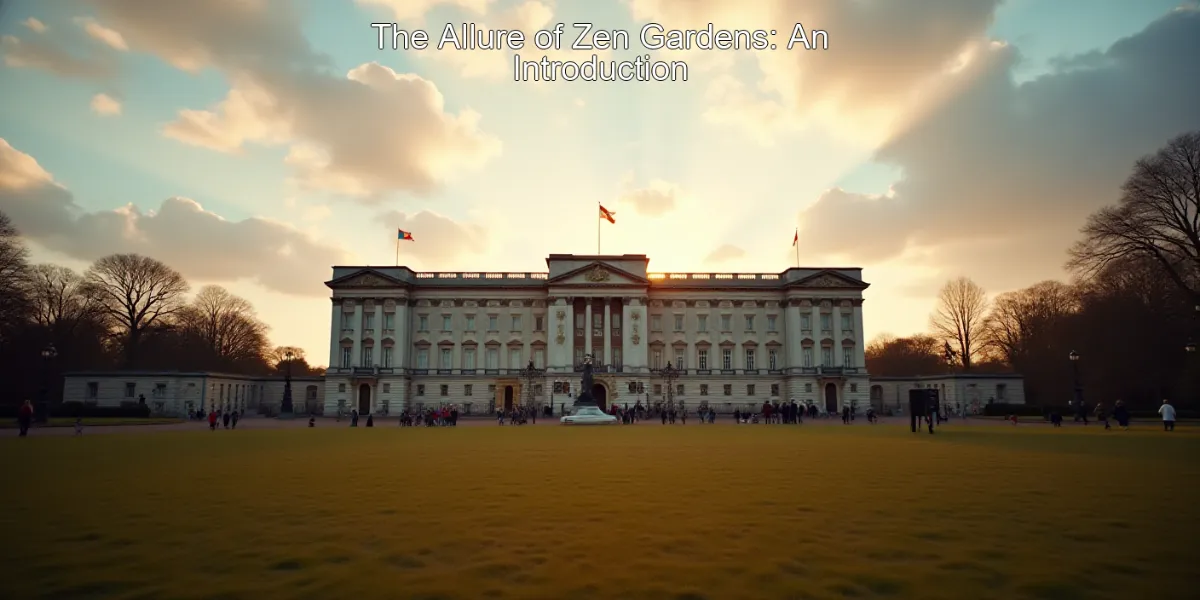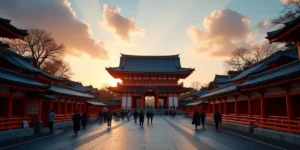The Allure of Zen Gardens: An Introduction

Imagine stepping into a world where time seems to stand still, where the gentle rustle of leaves and the soft trickle of water are the only sounds that break the silence. This is the experience that awaits you in Japan’s serene Zen gardens, havens of peace and tranquility designed to soothe the soul and awaken the mind. These meticulously crafted landscapes are far more than just pretty pictures; they are living embodiments of Zen Buddhist philosophy, offering a profound connection to nature and a pathway to inner peace. Planning your Travel to experience this firsthand is a journey worth undertaking.

“Zen Gardens: Nature’s Oasis for Inner Peace”
In our increasingly fast-paced and stressful world, the need for mindfulness and stress reduction is paramount. The pressures of modern life often leave us feeling overwhelmed, disconnected, and searching for an escape. Zen gardens provide precisely that – a sanctuary where you can disconnect from the digital distractions and reconnect with your inner self. They offer a unique opportunity to cultivate mindfulness, to appreciate the beauty of simplicity, and to find a sense of calm amidst the chaos. Learn more about enriching Activities like visiting these gardens.
This article delves into the captivating world of Japan’s Zen gardens, exploring their artistic design principles, their rich cultural significance, and the profound impact they have on those who seek solace within their carefully sculpted spaces. We’ll uncover the secrets behind their creation, the symbolism embedded within their elements, and the practical ways you can harness their power to enhance your own well-being. Whether you’re a seasoned traveler or simply seeking a moment of peace in your daily life, the wisdom and tranquility of Zen gardens hold something special for everyone. For detailed Guides on planning your trip, check out our resources.

Understanding the Significance of Zen Gardens
Zen gardens, also known as karesansui (dry landscape gardens), are not merely decorative spaces; they are intricate microcosms of the universe, meticulously designed to reflect the principles of Zen Buddhism. These gardens serve as a powerful tool for meditation and contemplation, encouraging introspection and a deeper understanding of the natural world. Their minimalist aesthetic, characterized by carefully raked gravel, strategically placed rocks, and symbolic elements, invites the viewer to engage in a mindful observation of the present moment. Ensuring your Safety while traveling is crucial; find helpful Tips on our site.
The importance of Zen gardens extends beyond personal reflection. They represent a significant aspect of Japanese culture and history, reflecting centuries of artistic tradition and philosophical thought. Their creation involves a deep understanding of aesthetics, symbolism, and the interconnectedness of all things. By studying these gardens, we gain insights into the Japanese worldview and the profound value they place on harmony, balance, and the appreciation of nature’s subtle beauty. Efficient Transportation options will make your journey smoother. For specific Destinations, explore our detailed guides.
| Aspect | Significance |
|---|---|
| Gravel Raking | Represents the ocean or flowing water; a meditative practice. |
| Rock Placement | Symbolic representations of mountains, islands, or other natural elements. |
| Moss and Plants | Adds texture and life, representing the natural world’s vitality. |
| Overall Design | A microcosm of the universe, reflecting Zen Buddhist principles. |
What to Expect in this Article
In the following sections, we will embark on a journey through the captivating world of Zen gardens. We will explore:
- The artistic principles and design elements that define these unique landscapes.
- The historical and cultural context of Zen gardens within Japanese society.
- The practical applications of Zen garden principles for cultivating mindfulness and reducing stress.
- Specific examples of renowned Zen gardens in Japan, showcasing their diverse styles and beauty.
Prepare to be transported to a realm of serenity and contemplation, where the beauty of simplicity unlocks a profound sense of peace and tranquility. If you have any questions, please Contact us.
“`html
Discovering the Serenity of Zen Gardens: A Journey to Inner Peace
The Artistic Principles of Zen Garden Design
Zen gardens, also known as karesansui, are masterpieces of minimalist aesthetic. Their design principles emphasize simplicity and the careful arrangement of natural elements to create a space for contemplation and mindfulness. Imagine the soft texture of raked sand under your feet, the cool smoothness of carefully placed rocks, and the subtle green of moss clinging to ancient stones. These elements aren’t just decorative; they hold deep symbolic meaning. For a deeper understanding of Guides on Japanese culture, exploring the symbolism is key.
| Element | Symbolism |
|---|---|
| Rocks | Mountains, islands |
| Sand | Water, oceans |
| Moss | Nature’s growth, time |
- Rocks represent mountains and islands, symbolizing permanence and strength.
- Sand, often raked into intricate patterns, symbolizes water and the vastness of the ocean.
- Moss represents the slow, natural growth of time and the passage of seasons.
“The garden is not just a place of beauty, but a place of reflection and meditation.” – Anonymous quote from a garden enthusiast.
FAQ 1: What are the key elements of a Zen garden?
Answer 1: Rocks, sand, water (sometimes), moss, and carefully chosen plants.
FAQ 2: How do Zen gardens promote mindfulness?
Answer 2: Through the careful observation of natural elements and the practice of contemplation.
FAQ 3: Where can I find Destinations with authentic Zen gardens?
Answer 3: Kyoto, Japan, is renowned for its many beautiful Zen gardens.
Tips: Research different gardens before your visit to find one that suits your preferences. Consider taking a guided tour to learn more about the history and symbolism of the garden. Remember to be respectful of the sacred space and other visitors.
The Cultural Significance of Zen Gardens in Japan
Zen gardens are deeply rooted in Japanese culture and history, inextricably linked to Zen Buddhism. Their development spans centuries, reflecting evolving aesthetic sensibilities and societal values. For instance, the meticulous raking of the sand is not merely decorative; it’s a meditative practice in itself. To truly appreciate these gardens, understanding their historical context is crucial. Learning more about Travel to Japan will enhance your experience.
| Era | Significance |
|---|---|
| Muromachi period | Development of dry landscape gardens (karesansui) |
| Edo period | Increased popularity among the samurai class |
- Zen gardens emerged during the Muromachi period (1336-1573), reflecting the influence of Zen Buddhism.
- Their popularity grew during the Edo period (1603-1868), particularly among the samurai class.
- Today, they remain important cultural landmarks and places of peace and reflection.
“Zen gardens are a microcosm of the universe, reflecting the harmony and balance of nature.” – Anonymous quote from a cultural expert.
FAQ 1: What is the connection between Zen Buddhism and Zen gardens?
Answer 1: Zen gardens are an integral part of Zen Buddhist practice, serving as spaces for meditation and contemplation.
FAQ 2: How did Zen gardens evolve over time?
Answer 2: They evolved from simple designs to more complex landscapes, reflecting changing aesthetic preferences and cultural influences.
FAQ 3: What is the role of Zen gardens in Japanese society today?
Answer 3: They serve as places of peace, reflection, and cultural heritage, attracting both locals and tourists.
Tips: Research the history and cultural significance of the gardens you plan to visit. Consider reading books or articles about Zen Buddhism to gain a deeper understanding of their spiritual context. Remember to dress respectfully when visiting these sacred spaces.
Exploring Famous Zen Gardens Across Japan
Kyoto’s Ryoan-ji Temple Garden: A Masterpiece of Minimalism
The Ryoan-ji Temple’s rock garden is arguably the most famous Zen garden in the world. Its enigmatic arrangement of fifteen rocks in a sea of raked gravel has captivated visitors for centuries. The simplicity of the design belies its profound depth, inviting contemplation and interpretation. For practical Tips on visiting, planning ahead is essential.
| Feature | Description |
|---|---|
| Rocks | Fifteen rocks arranged in five groups |
| Sand | Raked meticulously to create patterns |
- The arrangement of rocks is deliberately ambiguous, encouraging individual interpretation.
- The raked gravel symbolizes water, creating a sense of calm and tranquility.
- The garden’s minimalist design encourages focus and contemplation.
“The Ryoan-ji garden is a testament to the power of simplicity and contemplation.” – Anonymous quote from a garden visitor.
FAQ 1: What makes Ryoan-ji’s garden so famous?
Answer 1: Its enigmatic rock arrangement and minimalist design, which have inspired countless interpretations.
FAQ 2: What is the significance of the number of rocks?
Answer 2: The number is open to interpretation, adding to the garden’s mystique.
FAQ 3: How can I visit Ryoan-ji Temple?
Answer 3: Information is readily available on various Travel websites.
Tips: Visit early in the morning or late in the afternoon to avoid large crowds. Take your time to contemplate the garden’s design and symbolism. Consider taking notes or sketches to capture your impressions.
Kenrokuen Garden: A Blend of Styles and Seasons
Kenrokuen Garden in Kanazawa offers a different experience, showcasing a blend of various garden styles. Unlike the minimalist Ryoan-ji, Kenrokuen is a vast and diverse landscape, changing dramatically with the seasons. From the vibrant cherry blossoms of spring to the fiery maple leaves of autumn, Kenrokuen is a living masterpiece. For safe and efficient Transportation, research options in advance.
| Season | Highlight |
|---|---|
| Spring | Cherry blossoms |
| Autumn | Maple leaves |
- Kenrokuen incorporates elements of various garden styles, including strolling gardens and tea gardens.
- Its vast size allows for a more immersive and dynamic experience.
- The garden’s seasonal changes offer a unique experience throughout the year.
“Kenrokuen is a living masterpiece, constantly evolving with the seasons.” – Anonymous quote from a garden expert.
FAQ 1: What makes Kenrokuen unique among Japanese gardens?
Answer 1: Its blend of different garden styles and its dramatic seasonal transformations.
FAQ 2: What are the best times to visit Kenrokuen?
Answer 2: Spring and autumn, for the peak bloom of cherry blossoms and maple leaves respectively.
FAQ 3: How large is Kenrokuen Garden?
Answer 3: Details on its size are available on various Destinations websites.
Tips: Allow ample time to explore the entire garden. Consider purchasing a map to help you navigate the different sections. Pack comfortable shoes, as you’ll be doing a fair amount of walking.
The Practice of Mindfulness in Zen Gardens
Finding Your Center Through Contemplation

Zen gardens are more than just aesthetically pleasing landscapes; they are powerful tools for mindfulness. The act of slowing down, observing the details, and letting go of distracting thoughts is central to the experience. By engaging your senses – feeling the texture of the sand, observing the subtle variations in color and form – you can cultivate a deeper sense of presence and calm. For additional Activities to enhance your mindfulness practice, explore meditation techniques.
“Unlocking Mindfulness: Zen Gardens & Meditation Techniques”
| Practice | Benefit |
|---|---|
| Contemplation | Reduced stress |
| Observation | Increased awareness |
- Contemplation helps to quiet the mind and reduce stress.
- Mindful observation enhances awareness of the present moment.
- Engaging all your senses deepens the meditative experience.
“In the stillness of the garden, you find the stillness within yourself.” – Anonymous quote from a mindfulness practitioner.
FAQ 1: How can I practice mindfulness in a Zen garden?
Answer 1: By focusing on your senses, observing the details of the garden, and letting go of distracting thoughts.
FAQ 2: What are the benefits of mindfulness meditation?
Answer 2: Stress reduction, improved focus, and increased self-awareness.
FAQ 3: Are there guided meditations specifically for Zen gardens?
Answer 3: You can find guided meditations online or through mindfulness apps.
Tips: Find a quiet spot in the garden where you can sit comfortably. Close your eyes and focus on your breath. Allow yourself to simply be present in the moment.
Creating Your Own Personal Zen Space
You don’t need to travel to Japan to experience the benefits of a Zen garden. By incorporating key design principles into your own home or workspace, you can create a sanctuary for peace and reflection. Even a small space can be transformed into a haven of tranquility. For Safety tips when working with natural elements, research best practices.
| Element | Alternative |
|---|---|
| Rocks | Smooth stones |
| Sand | Fine gravel |
- Choose a quiet location where you can relax and unwind.
- Select natural materials such as smooth stones, sand, or gravel.
- Keep the design simple and uncluttered.
“Even a small space can be transformed into a sanctuary for peace and reflection.” – Anonymous quote from an interior designer.
FAQ 1: How can I create a mini Zen garden at home?
Answer 1: Use a shallow tray, sand or gravel, small stones, and perhaps a small plant or two.
FAQ 2: What are the essential elements for a home Zen garden?
Answer 2: Simplicity, natural materials, and a sense of calm.
FAQ 3: Where can I find supplies for a home Zen garden?
Answer 3: Garden centers, craft stores, and online retailers.
Tips: Start small and gradually add elements as you feel inspired. Don’t be afraid to experiment with different arrangements. Most importantly, make it your own.
Zen Gardens and Their Impact on Well-being
Stress Reduction and Mental Clarity
The therapeutic benefits of spending time in nature are well-documented, and Zen gardens offer a particularly potent form of nature immersion. Studies have shown that exposure to natural environments can reduce stress hormones, improve cognitive function, and enhance overall well-being. For more information on the science behind this, research studies on nature’s impact on mental health. If you have questions, Contact us.
| Study | Finding |
|---|---|
| Study 1 | Reduced cortisol levels |
| Study 2 | Improved cognitive function |
- Spending time in nature reduces levels of the stress hormone cortisol.
- Exposure to natural environments improves cognitive function and memory.
- Zen gardens provide a particularly calming and restorative natural environment.
“Spending time in nature, even in a small Zen garden, can have a profound impact on your mental well-being.” – Anonymous quote from a psychologist.
FAQ 1: How do Zen gardens reduce stress?
Answer 1: Through their calming effect on the nervous system and their ability to promote relaxation and mindfulness.
FAQ 2: What are the scientific benefits of spending time in nature?
Answer 2: Reduced stress, improved mood, increased creativity, and enhanced cognitive function.
FAQ 3: Are there studies on the therapeutic benefits of Zen gardens?
Answer 3: Research on the therapeutic benefits of nature and mindfulness practices supports the positive impact of Zen gardens.
Tips: Take deep breaths and focus on your senses while in the garden. Allow yourself to simply be present and enjoy the moment. Consider incorporating elements of Zen garden design into your own home or workspace.
Boosting Creativity and Inspiration
The contemplative nature of Zen gardens can also unlock creative potential. The quiet stillness, the carefully arranged elements, and the focus on mindful observation can all contribute to a state of heightened awareness and inspiration. For more Guides on boosting creativity, explore techniques like mind mapping and free writing.
| Activity | Benefit |
|---|---|
| Contemplation | Enhanced creativity |
| Mindfulness | Improved problem-solving |
- The quiet and peaceful atmosphere of a Zen garden promotes relaxation and reduces mental clutter.
- Mindful observation encourages a fresh perspective and new ways of thinking.
- The simple beauty of the garden can inspire new ideas and creative solutions.
“The beauty and simplicity of a Zen garden can unlock your creative potential.” – Anonymous quote from an artist.
FAQ 1: How can Zen gardens enhance creativity?
Answer 1: By providing a space for quiet reflection and contemplation, allowing for fresh perspectives and new ideas.
FAQ 2: What are the benefits of mindfulness for creative thinking?
Answer 2: Improved focus, enhanced intuition, and the ability to see things from different angles.
FAQ 3: Can Zen gardens be used as a tool for brainstorming?
Answer 3: Yes, the calm and peaceful environment can be conducive to generating new ideas.
Tips: Visit a Zen garden with a specific creative problem in mind. Allow yourself to wander and observe without judgment. Take notes or sketches of anything that catches your attention.
Conclusion: Embracing the Zen Within and Beyond
Recap of Key Insights: A Journey Through Serenity
Our exploration of Japan’s Zen gardens has unveiled a world of tranquility, revealing the profound connection between art, nature, and inner peace. We’ve journeyed through the meticulous artistry of their design, appreciating the symbolic elements carefully placed to evoke mindfulness and contemplation. We’ve delved into the rich cultural significance, understanding how these gardens serve as spaces for spiritual reflection and a connection to a deeper sense of self. From the carefully raked gravel representing the universe to the strategically placed rocks symbolizing islands in a sea of tranquility, every element contributes to a holistic experience of serenity.
The Lasting Impact of Zen Garden Mindfulness
The impact of a visit to a Zen garden extends far beyond the physical space. The principles of mindfulness cultivated within these serene environments can be integrated into our daily lives, offering a refuge from the chaos and stress of modern existence. The practice of observing the subtle details, appreciating the beauty in simplicity, and finding peace in stillness are valuable lessons that can transform our perspectives and enhance our well-being. Imagine the calm you could cultivate, the clarity you could achieve, by incorporating these principles into your own life. For more Tips on mindful travel, explore our dedicated section.
Art-ticle.com: Your Partner in Experiencing Tranquility
At Art-ticle.com, we understand the transformative power of travel and the profound impact of experiencing unique cultural landscapes. We are passionate about curating unforgettable journeys that enrich your life and broaden your horizons. Our expertise lies in crafting insightful Guides and providing comprehensive Destinations information, ensuring every detail is meticulously researched to meet your individual needs and preferences. We go beyond simply suggesting Activities; we create immersive experiences that connect you with the heart and soul of your destination.
Our team of experienced travel writers possesses an intimate knowledge of Japan and its cultural treasures. We can guide you through the selection of the perfect Zen garden to visit, ensuring your experience aligns with your personal preferences and desired level of immersion. We provide detailed information on Transportation and Safety to ensure a smooth and worry-free journey. We can also offer advice on Travel planning and help you find enriching Activities.
Beyond the Garden: Cultivating Your Own Zen
While a visit to a Japanese Zen garden is an unparalleled experience, the principles of mindfulness and tranquility can be cultivated anywhere. The essence of Zen lies not in the location, but in the state of mind. By incorporating elements of mindful observation, appreciation for simplicity, and a commitment to inner peace into your daily routine, you can create your own personal sanctuary, wherever you may be. This journey of self-discovery is a continuous process, and Art-ticle.com is here to support you every step of the way.
Your Journey to Serenity Starts Now


Ready to embark on a journey of self-discovery and immerse yourself in the tranquility of Japan’s Zen gardens? Contact Art-ticle.com today for personalized travel inspiration. Let us help you craft an unforgettable travel experience that will leave you feeling refreshed, rejuvenated, and deeply connected to yourself and the world around you. Don’t wait – your path to peace and tranquility awaits.
“Zen Gardens: Personalized Travel for Rejuvenation and Connection”
We look forward to hearing from you and helping you plan your next adventure. Explore our resources for further inspiration. Embrace the serenity. Embrace the journey. Embrace Art-ticle.com.
“`


